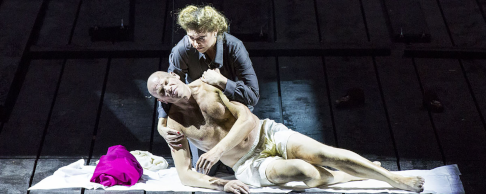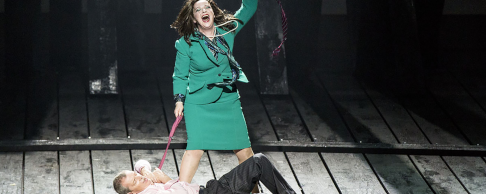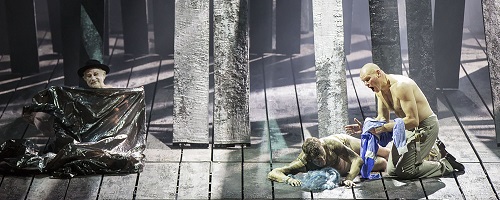Nearly four decades later, Reimann’s opera has become a modern classic. It
now seems to me both easily accessible and deeply moving; thus, I welcomed
a chance to attend the second of three performances at this year’s Maggio
Musicale Fiorentino. As is often the case with modern operas, even
established ones, about 5% of the seats were empty, while another 5% of the
audience slipped out at intermission. Those who remained, however, rewarded
the performers enthusiastically—and were themselves rewarded when the
83-year old composer himself took a bow. It is a sign of how times have
changed when elderly Florentines leave such a performance enthusing “bella,
bellissima!”
This production reassembles the conductor, sets, stage team, and most of
the cast of a 2016 run in Paris. Danish baritone Bo Skovhus owns the title
role these days. (You can view his interpretation, in slightly fresher
voice compared to what I heard in Firenze, on this DVD from
Arthaus Musik DVD
of a 2014 Staatsoper Hamburg performance.) His approach to the role is
clear, forceful, well-enunciated and projects a coherent character. It is,
of course, always unfair to compare any singer to Dietrich
Fischer-Dieskau—especially in this case, since Reimann wrote Lear expressly
for him. Yet doing so highlights a critical difference in emphasis.
Fischer-Dieskau approaches the part with the Lieder singer’s understatement
and subtlety, thereby underscoring the traditional view that Shakespeare’s
Lear is an old man, tired and infirm at the start and dead at the end. This
interpretation also made the most of the singer’s own advancing age: it was
the last operatic part Fischer-Dieskau would record. In 1982, I remember
being surprised that his aging voice, never the largest, sounded so small
in the theater.

Skovhus, by contrast, is a large man who radiates good health—not to
mention possessing some impressive pecs, which he displays for most of the
show. He also prefers to use his resonant voice at forte. Thus,
when bad things befall him on stage, he tends to comes across as a
well-meaning Hollywood superhero temporarily laid low. One feels little of
the human frailty and loneliness so central to Shakespeare’s Lear and
particularly emphasized in Reimann’s opera, which purposefully drops “King”
from the title to stress that he is an everyman. Watching Skovhus in this
role, his musical mastery somehow never quite dislodges my expectation that
he will somehow prevail in the final reel.
Two of the three daughters did not appear in the Paris cast. Spanish
soprano Ángeles Blancas Gulin brings a powerful and steely tone to the role
of Gonderil. The fact she seems so monochromatically brash may lie
partially in the way Reimann wrote the role. Two Swedish sopranos, Agneta
Eigenholz and Erika Sunnegårdh, add much. Eigenholz possesses a pretty and
well-focused voice, though perhaps could do more to project Cordelia’s own
painful self-realizations in the penultimate scene—Várady being the unfair
comparison here. Sunnegårdh misses some chances to make more of the wild
coloratura Reimann uses to express Regan’s hysteria: to judge by tapes, her
voice has grown heavier since Paris three years ago.
British counter-tenor Andrew Watts portrays Edgar (aka Tom) with subtle
inflection and a fully rounded sound, if occasionally wavering diction.
Young Turkish Baritone Levent Bakirci, trained in Philadelphia and working
his way up in the German system, cuts a dashing—if oddly young and
good-looking—character as Gloucester, and sings with precision and a clear
sound, particularly at the top of the voice. This is a singer to watch.
German actor Ernst Alisch plays the speaking-singing role of the fool with
astonishing vividness, subtlety and power—not least since he is 79 years
old. Kor-Jan Dusseljee, Frode Olsen, Derek Welton and Michael Colton round
out the cast, all singing in the full-throated manner this production
treats as the norm.

Reimann’s thick and complex score demands much of both conductor and
orchestra. Fabio Luisi, the musical director of the Maggio Musicale,
conducts—today less than 24 hours after leading a demanding orchestral
program of Schubert and Mahler. Luisi’s approach is clear and detailed, and
he drew excellent playing out of the orchestra—even if the tone sometimes
seems to lack the full measure of delicacy, transparency and voicing,
qualities one normally associates with Luisi. Some of this may be due to
Firenze’s relatively new opera house, the acoustics of which I am still
getting to know, or perhaps the orchestra, which otherwise responded
brilliantly.
Calixto Bieito has achieved controversial celebrity in the opera world with
a “throw everything at the wall and the s--- will stick” approach to stage
direction. Here, uncharacteristically, he restrains himself during the
first third of the work: a closed, narrow and essentially unchanging set
amplifies the sound and invites the audience to trace intimate links among
characters. At some point, however, Bieito begins to throw in assorted
post-modern clichés: a slowly deconstructing set that diffuses the sound,
Luis Buñuel-style projections of farm animals and eyeballs, disrespect for
the “fourth wall,” a bloody half-suicide unmentioned by Shakespeare, some
dominatrix play with neckties, and a full-frontal nude male of prodigious
endowment. At the end, true to cliché, Lear does not die but sits quivering
in mute madness.
Little of this illuminates Shakespeare’s text. If Bieito’s focus on sex and
barnyards is meant to underscore humanity’s animalistic side, as one
assumes, why do the shenanigans on stage began just at the moment when both
Shakespeare’s play and Reimann’s music turn back inexorably toward the
uniquely human quality at the center of the play, namely the ability to
feel profound regret? Madness, rather than death, at the end similarly
makes little sense in context.
This type of directorial self-indulgence tends to come from individuals
with little ear for music—and correspondingly little confidence in its
ability to carry the drama. For most of the second act, therefore, I gave
up on Bieito. I sat back, closed my eyes and wondered at the compositional
mastery underlying this marvelous score, which incrementally tightens the
musical focus and raises the existential stakes up to the very last second,
when Reimann’s music magically dissolves into nothingness.
Andrew Moravcsik
Aribert Reimann: Lear
König Lear - Bo Skovhus, König von Frankreich - Frode Olsen, Herzog von
Cornwall - Michael Colvin, Graf von Kent - Kor-Jan Dusseljee, Graf von
Gloster - Levent Bakirci, Edgar - Andrew Watts, Edmund - Andreas Conrad,
Goneril - Angeles Blancas Gulin, Regan - Erika Sunnegårdh, Narr - Ernst
Alisch; Director - Calixto Bieito, Conductor - Fabio Luisi, Orchestra and Chorus of the Maggio Musicale Fiorentino.
Maggio Musicale Fiorentino; Saturday, 5 May 2019.


